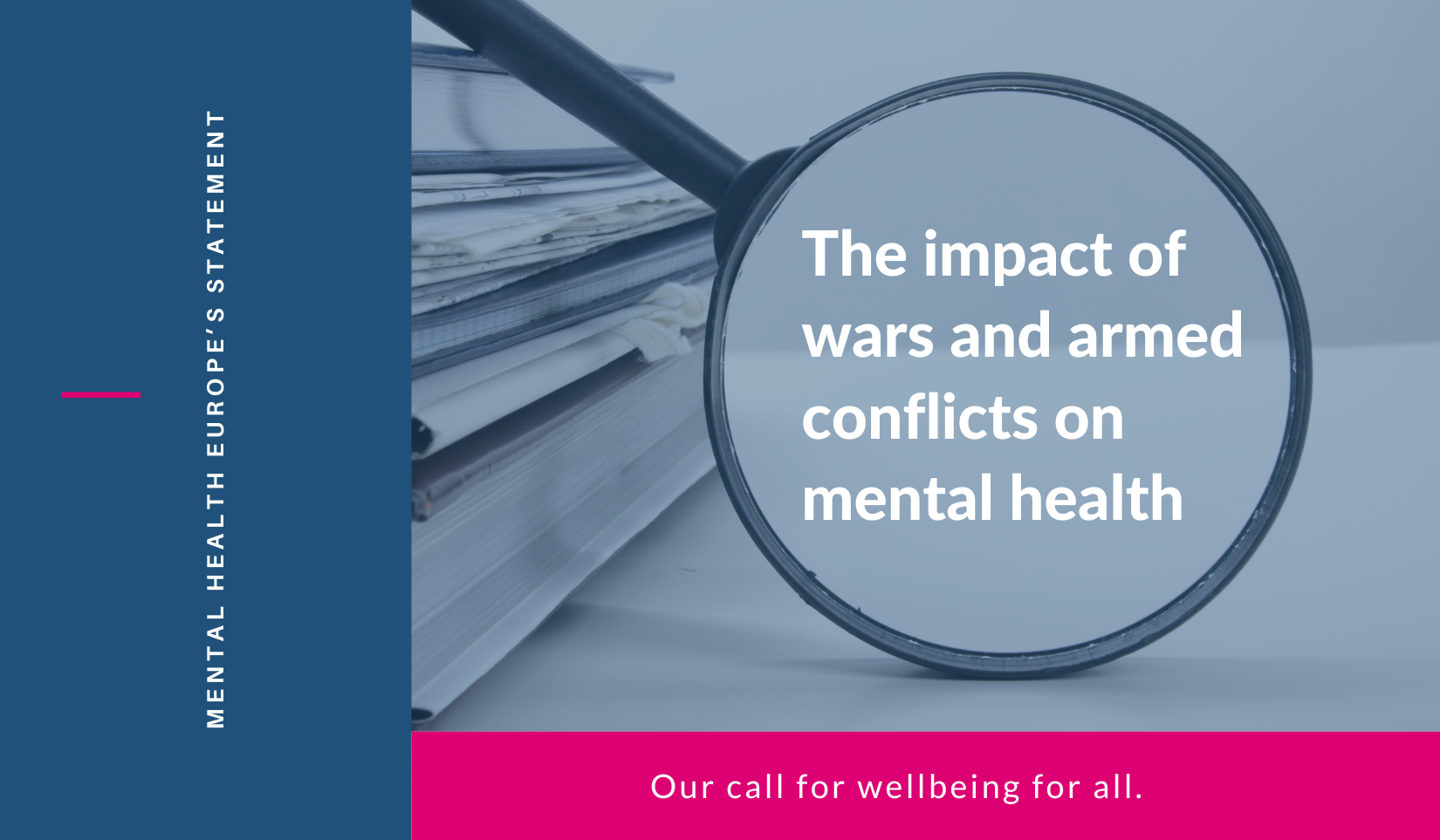The impact of wars and armed conflicts on mental health

In an increasingly tumultuous world, ongoing wars and armed conflicts are leaving a trail of suffering and psychological trauma in their wake. From the Ukraine war to conflicts in Central Sahel, to the recent conflict in Israel-Gaza, Mental Health Europe is deeply concerned about the mental health impact on individuals, communities and society, and in particular on children, young people, the disabled, and the elderly. These conflicts serve as a distressing reminder of how the wellbeing of millions can be collectively jeopardised.
This year’s World Mental Health Day on 10 October provided an opportunity for people and communities to unite under the theme “Mental health is a universal human right.” Among others, this year World Health Organization’s campaign linked to the Day aimed to raise awareness and promote actions that uphold everyone’s mental health as an inalienable human right. At its heart is the recognition and respect for the human rights of individuals as the foundation for wellbeing.
A universal human right
Mental health is a fundamental human right for all individuals worldwide: every person has the right to the highest attainable standard of mental health. The WHO says that “Good mental health is vital to our overall health and well-being. Everyone, whoever and wherever they are, has a right to the highest attainable standard of mental health.” Wars and armed conflicts lead to violations of human rights. The violence inflicted on civilians, the loss of lives, and the erosion of human rights and dignity are issues that demand global attention and intervention. It is a fundamental human right to live in societies and environments that guarantee safety and security, and the persistent failure to protect civilians in conflict areas is a violation of these human rights.
The toll of armed conflicts
Conflict zones bear witness to the profound toll of persistent violence and upheaval on civilians. Children, young people, the disabled, and the elderly are especially susceptible to the devastating effects of these conflicts. The ongoing turmoil serves as a stark reminder of how the collective wellbeing of millions can be endangered.
Access to basic needs
Amidst these conflicts, it is essential to remember that all individuals, regardless of their circumstances, have the right to access basic necessities. Food, shelter, safety, and essential services like water and electricity are fundamental human needs that must not be compromised.
Psychosocial support for all
To address the psychological trauma and distress caused by these conflicts, it is imperative to provide psychosocial support to all affected individuals. The psychosocial approach draws the attention to the fact that human experiences are varied and that there are a series of determinants impacting a person’s life (e.g. socio-economic factors, level of education, challenging or traumatic life-events, environment). This approach shows that recovery is not merely through medical treatment but includes various elements such as therapy, peer support and recognition of the socio-economic determinants as well as the environment.
The immediate and long-term psychological impacts of such conflicts on civilians, especially children and young people, are well-documented. Access to psychosocial mental health support should be a vital component of humanitarian assistance during these times. Humanitarian organisations can play a vital role in providing psychosocial support to victims of war, thus access to humanitarian aid must always be ensured by warring parties.
Global guidelines on mental health and psychosocial support in emergency settings
The Inter-Agency Standing Committee (IASC) Reference Group on Mental Health and Psychosocial Support in Emergency Settings plays a pivotal role in promoting mental health support during conflicts. They have developed Guidelines on Mental Health and Psychosocial Support (MHPSS) in Emergency Settings through an inclusive process, with input from UN agencies, NGOs and universities. These Guidelines help to plan, establish and coordinate a set of minimum multi-sectoral responses to protect, support and improve people’s mental health and psychosocial wellbeing in the midst of an emergency.
Our paper: ‘Mental health and geopolitical crises: Ukraine and beyond’
For a more profound understanding of the relationship between mental health and geopolitical crises, Mental Health Europe has published a paper shedding light on the subject. The challenges and devastations caused by war and armed conflicts are irrefutable. With increased attention, solidarity and policy interventions, these conflicts may offer us the chance to reframe the way we talk about mental health and underline how our mental health is shaped by a wide range of social determinants. This paper aims to explore the key short, medium, and long-term challenges to mental health linked to the Ukraine war and beyond, and how mental health support should be prioritised as part of a comprehensive approach to wellbeing.
Our call for wellbeing for all
In a world marked by growing discord and conflicts, it is imperative that we unite around common values. The call for peace is universal, and the wellbeing of all individuals must take precedence. We stand in solidarity with all those working to safeguard human life. We echo international calls for peace and respect for international humanitarian law. In our highly divided world, it is crucial that we seek common ground, engage in dialogue, and work towards the common good and peace.
The ongoing conflicts around the world cast a long shadow over the lives of countless people across the globe. It is our collective responsibility to ensure that mental health support, access to basic needs, and human rights are safeguarded, even in the most challenging of circumstances.
Peace is a fundamental prerequisite for all to thrive. Let us commit to working toward a world where peace, well-being, and mental health are accessible to all. Mental health is a human right, and all people worldwide deserve to live free from violence, fear, psychological distress and trauma, enabling their mental health and wellbeing to flourish throughout their lives.
For further resources on mental health during crises, please visit this webpage.
Stay connected
Get our latest news, personal stories, research articles, and job opportunities.